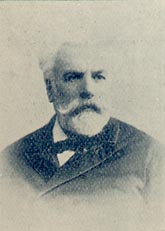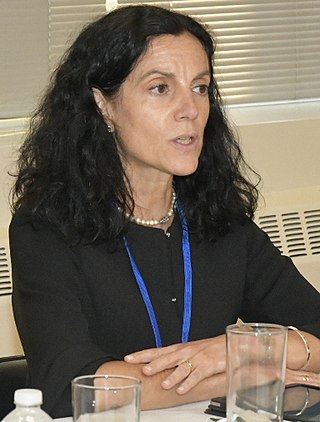Related Research Articles

The politics of Uruguay abide by a presidential representative democratic republic, under which the president of Uruguay is both the head of state and the head of government, as well as a multiform party system. The president exercises executive power and legislative power and is vested in the two chambers of the General Assembly of Uruguay. The Judiciary is independent from the executive and legislature.
Alberto Guani Carrara was a Uruguayan jurist, diplomat and the Vice President and President of the Senate from 1943 to 1947.

José Luis Gabriel Terra Leivas, better known as Gabriel Terra, was a lawyer, professor, economist, writer, statesman and politician. Between 1900 and 1939 he served as a prominent advisor to all Uruguayan governments on diplomatic, economic and financial issues, between 1907 and 1922 he held important ministries, he was a member of the National Council of Administration between 1926 and 1929. He governed as Constitutional President from March 1 from 1931 until his self-coup on March 31, 1933, beginning the historical period called "Terra dictatorship" or "Third Republic", he governed temporarily until March 1, 1934, dissolved the Collegiate and recovered the single executive system through the Constitution of 1934 ruling until June 11, 1938.

Duncan Antonio Stewart Agell, was a Uruguayan president of Scottish Argentine origin. He served as interim President of Uruguay for a brief time in 1894.
César Charlone Rodríguez was a Uruguayan political figure.

The following outline is provided as an overview of and topical guide to Uruguay:

The Government of Lithuania, officially the Government of the Republic of Lithuania, is the cabinet of Lithuania, exercising executive power in the country. Among other responsibilities, it executes laws and resolutions of the parliament, the Seimas, and the decrees of the President, manages state property and, together with the president, executes the foreign policy of the country. The Government also has the right of legislative initiative, puts together the state budget and presents it to the Seimas for approval.

Luis Alberto Heber Fontana is a Uruguayan political figure of the National Party who served as Minister of Interior between May 24, 2021 and November 2023. He previously served as Minister of Transport and Public Works, Senator (1995–2020) and as National Representative (1985–1995).
The Ministry of the Interior of Uruguay is the ministry of the Government of Uruguay that is responsible for controlling, regulating and evaluating policies, programs and plans related to public safety, as well as guaranteeing citizens the free exercise of fundamental rights and freedoms.

The Ministry of Education and Culture of Uruguay is the ministry of the Government of Uruguay that is responsible for the coordination of national education, the promotion of the country's cultural development, the preservation of the nation's artistic, historical and cultural heritage, as well as innovation, science and technology and the promotion and strengthening of the validity of human rights. It is also responsible for the development of the state communication multimedia system and for promoting the digitized access of the entire population to information.

The Ministry of Labour and Social Welfare of Uruguay is the ministry of the Government of Uruguay that is responsible for conducting and carrying out policies related to labor activity in the country, as well as supervising social and food benefits.
Ledo Arroyo Torres (1894–1975) was a Uruguayan notary and politician.

The Ministry of Economy, Trade and Enterprise (MINECO) is the department of the Government of Spain responsible for the proposing and carrying out the government policy on economic affairs, business support and reforms to improve economic potential growth as well as acting as the communication channel with the European Union and other economic and financial international organizations in this matters. Likewise, this department is responsible for the telecommunications policy and the digital transformation.

The Government of the Union of Soviet Socialist Republics (USSR) was the executive and administrative organ of the highest body of state authority, the All-Union Supreme Soviet. It was formed on 30 December 1922 and abolished on 26 December 1991. The government was headed by a chairman, most commonly referred to as the premier of the Soviet Union, and several deputy chairmen throughout its existence. The Communist Party of the Soviet Union (CPSU), as "The leading and guiding force of Soviet society and the nucleus of its political system" per Article 6 of the state constitution, controlled the government by holding a two-thirds majority in the All-Union Supreme Soviet. The government underwent several name changes throughout its history, and was known as the Council of People's Commissars from 1922 to 1946, the Council of Ministers from 1946 to 1991, the Cabinet of Ministers from January to August 1991 and the Committee on the Operational Management of the National Economy from August to December 1991.

Azucena María Arbeleche Perdomo is a Uruguayan professor, economist and civil servant who serves as Minister of Economy and Finance of Uruguay since March 1, 2020 under president Luis Lacalle Pou, being the first woman to hold that office.

The Ministry of National Defense of Uruguay is a ministry of the Government of Uruguay that is responsible for coordinating and executing all civil and military activities aimed at preserving the sovereignty, independence and the peace of the country. It is the administrative and executive body of the Armed Forces of Uruguay.

The Ministry of Social Development of Uruguay (MIDES) is the ministry of the Government of Uruguay that is responsible for proposing, generating and activating national social policies. It is headquartered in the 18 de Julio Avenue in Barrio Cordón, Montevideo. The current Minister of Social Development is Martín Lema, who has held the position since May 3, 2021, after Pablo Bartol was removed from office by the President.
The COVID-19 pandemic in Uruguay has resulted in 1,041,232 confirmed cases of COVID-19 and 7,660 deaths.

Julio Daniel Salinas Grecco is a Uruguayan neurologist and politician of Open Cabildo (CA), who served as Minister of Public Health of Uruguay from 1 March 2020 to 13 March 2023.

The presidency of Luis Lacalle Pou began on 1 March 2020 when he was inaugurated as the 42nd president of Uruguay. Lacalle Pou, a member of the National Party took office following his victory over the Broad Front nominee Daniel Martínez in the second round of the 2019 general election, which ended the 15-year leftist rule in the country and the return of National Party to the Executive since his own father was the president in 1990–1995. On 16 December 2019, after his victory in the second round and before his inauguration, he announced his cabinet consisting of leaders of National, Colorado, Cabildo Abierto and Independent parties, members of the Multicolor Coalition.
References
- ↑ "Nuevos secretarios de Estado firmaron Libro de Actas ante el flamante presidente, Luis Lacalle Pou - Presidencia de la República". www.presidencia.gub.uy. Retrieved 2020-03-06.